By Mark McGee
Joel Stewart, a chemist by trade and a lover of the Tennessee Walking Horse as a hobby, possesses all three of those traits Edison outlined. He was born to be a chemist, though his first career goal was to be a medical doctor.
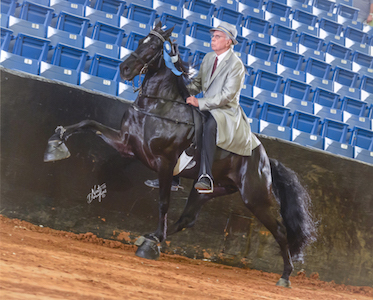
“I thought being a doctor would be interesting with a lot of challenges,” Joel said. “I had wanted to be a doctor since I was a little kid and you had to go through the chemistry department to do that. I started college at, then, Memphis State College (now University of Memphis) in 1959 and went through the premed program. Back then they didn’t have student loans and all of the financial stuff they have today. If you didn’t have the money, you just didn’t do it. I ran out of money.”
He would finish at Memphis with Master of Chemistry degrees in physical, pharmaceutical and lab chemistry.
“I have a minor in accounting because I figured out I was going to need to know something about money. It really has paid off for me. I didn’t want to be an accountant, but it is helpful with business.”
Country to the city
Stewart’s early childhood was spent on a farm in rural Mississippi.
“We lived on a farm outside of Bruce, a little town about 20 miles south of Oxford,” Joel said. “We were way out in the country. We were nine miles from anything.”
It was in this rural setting where Joel developed a love for school as well as a love for horses.
“My grandmother, Augusta Stewart, was a school teacher,” Joel said. “We were taught in school and out of school. She started teaching us early. I liked school. It was not a chore for me. I credit my grandmother for that.”
He would finish his high school education at Treadwell High School in Memphis.
“Moving to Memphis was a huge step,” Joel said. “We moved to Memphis when I was starting in the seventh grade. It was like a different world. I went from a little school that probably had 200 students to 413 in my class. We actually had indoor toilets and indoor heat. Memphis is a super town. It had a great educational system. The public schools were really good then.”
While on the farm he also developed his love for horses, a love that someday might have saved his life.
“I can remember riding before I went to school,” Joel said. “To me you are born liking horses. It is not an acquired taste. It is something in your genes.”
A born chemist
Joel also had a knack for chemistry intertwined into his genes with his love for horses. He has always enjoyed mixing chemicals together for a specific purpose.
“For some strange reason that kind of stuff has always come easy to me,” Joel said. “I don’t know. It is just the way God made me. It just pops in my mind that I need this or that to make a product work.”
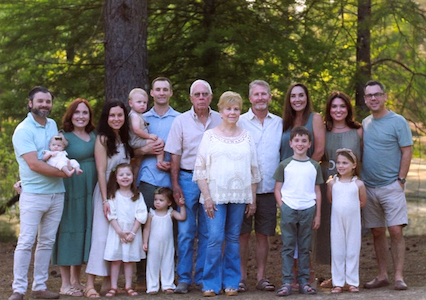
He credits his father, also named Joel, for providing those genes. The younger Joel is not a junior due to him having a different middle name than his father. He points out him, his father and his son are named Joel after the book in the Old Testament.
“My Dad was a mechanical genius,” Joel said. “He overhauled a John Deere tractor when he was 12 years old. I asked, ‘Dad, how did you know what to do?’ He said, he just knew.”
With chemistry, the key for Joel is to determine what he wants the outcome of a chemical mixture to do.
“You sort of look at what you are trying to accomplish first,” Joel said, “then you start putting together what it would take. There is a lot of trial and error. The fun thing is what you get at the end…knowing I did that or I accomplished that. Everyone wants to be successful.”
Patience is one of Joel’s virtues. He possesses a calm demeanor.
“I rarely get upset,” Joel said. “That is the way I am made, I guess. My Dad was that way too.”
A winning formula
After graduating from college Joel started working for the Pfizer Drug Company.
“I worked for Pfizer for 10 years in a number of different jobs in training, the research department and sales,” he said. “They sent me all over the country.”
His next stop was a small company named Dorsey where he worked for two years. Richard Jackson, who also worked at Dorsey, decided he and Joel should start their own company. The Stewart-Jackson Pharmaceutical Company opened for business in Memphis in 1975.
“Richard had sales experience and he had money,” Joel said. “I had chemistry experience and no money. We made a good combo. We worked nine states with salesmen when we owned the company – Mississippi, Alabama, part of Florida, part of Georgia, Arkansas, most all of Texas, Louisiana and Tennessee as far as Roanoke, Virginia.”
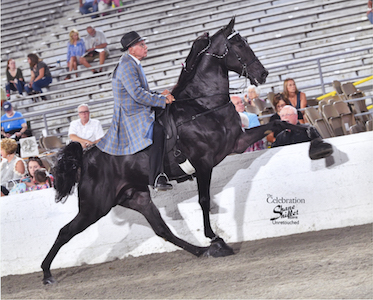
Joel worked almost 35 years with the company. Jackson bought him out so his daughter could come into the business in 2003, and Joel stayed on as a consultant for three years.
During his time with the company, he was able to do some medical work developing a shot known in the medical field as a “sinus cocktail” to fight sinus infections.
“When we owned the drug company, people were having a problem with sinus infections; and they still do today,” he said. “I took a couple of people to lunch and they were complaining about sinus infections. I said, `let’s see what our company can do about it’. The reason it works is when people get through with the antibiotics they still have inflammation which keeps it stirred up. The first thing you know, you have another sinus infection because of that. But, if you can clear the inflammation out, then the antihistamine helps dry you up and the two steroids will get rid of the inflammation. It is a good product. It really works.”
Joel still sees clinics advertising the availability of the shot, an antihistamine combined with two steroids.
The company also developed a product to help miners suffering from black lung symptoms.
“It was one of our specialties used in the West Virginia and East Tennessee coal fields.”
Grease is the word
One of Joel’s contributions to the Tennessee Walking Horse industry was his development of a variety of grease products to assist trainers.
“There was very little trial and error in developing the grease,” he said. “It was pretty easy.”
Joel took a down-home approach to developing his grease products. He would talk to trainers and ask them what they needed, and then he would find a way to formulate a product to satisfy their needs.
“You satisfy a need and a product is going to sell,” Joel said. “If you are a chemist you know what these chemicals can do when they are put together. That is part of your training.
“I developed the products with the help of the trainers. A trainer would say, `I need so and so’. So I would go back and develop it. That is how the products came about one or two a year at a time depending on what the trainers were needing.”
Neal Robinson, a trainer, was the first person who told Joel he needed something for his horses. He would not be the last.
Trainer Whitey Whitehead offered Joel a number of challenges in developing products to assist him in training.
“Whitey would call me once a month,” he said. “He would tell me he found an old product in his tack room and wanted to know if I could make some of it. I could help him with some of it if I could find the ingredients were still available. Some of them were so old you couldn’t get the ingredients.”
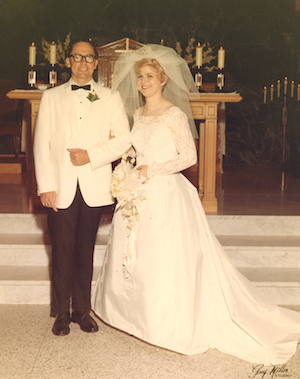
Joel had a shop at his house where he would develop the different types of grease. His primary sales sources were National Bridle Shop, World Champion and Winner’s Circle.
“I made all the grease they used back in the day,” Joel said. “I had nine or 10 different products. It was pretty successful. Even after I retired from the other company, I kept on doing that. But I got tired of working so I sold it to a guy in East Tennessee. I don’t know what happened. It isn’t on the market anymore.”
While the money was good from the sale of his grease products, Joel developed something more important – close, long-term friendships.
“It was fun,” Joel said. “I got to know the trainers really well when I was out showing them what the products were and made a lot of friends.
“It is nice to have all that many friends. It is fun to ride, fun to show. But, all the friends you make from all over the country are probably the No. 1 thing for me. My wife, Linda, always says you are over there talking to so and so and I am ready to go. But there are people you don’t see, except at some of the shows, and a lot of them we have made lifelong friends with. That is a strong part of the walking horse business.”
A smooth ride
On the advice of his doctor, Joel began riding Tennessee Walking Horses in 1990.
“When we started the pharmaceutical business we were working 18 hours a day and I started having a little stomach trouble,” he said. “The doctor asked me ‘what are you doing for entertainment?’ I said, I was doing nothing.
“He told me I needed to do something to take a break. He asked me what did I like and I said horses. He said, `get you a horse’. And that is how I got started.”
“My sister showed quarter horses,” Joel said. “I never liked to ride on them with the trotting gait. I liked the walking horse and its smooth gait. That is the big advantage of the walking horse, the smooth gait.”
Joel’s first trainer was Neal Robinson. After two years he moved to Dickie Woods’ Stables.
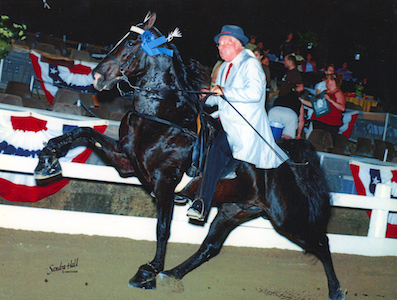
“I learned a great deal from Neal,” Joel said. “He really knew a lot about horses. I stayed with Dickie for 25 years until he passed away.”
The next move was to Edgar Abernathy where Joel is based today.
“When Dickie passed away, I moved to Edgar and we have been together ever since,” he said. “We get along, most of the time. Edgar and I are on the same boat. His barn stays full. I like the way he works his horses. They are in shape. He feeds them good. He takes care of them well. Overall, I am really happy with him as a trainer.”
Joel is always impressed by what Abernathy can see just from watching a horse work out.
“In my opinion he is the best ground man in the business as far as looking at a horse and knowing what to do with him,” Joel said. “Farrier Mike ‘Red’ Umberger never really rode, but he also can look at a horse and tell you what to do with it. I always thought Buddy Hugh and Wink Groover were good at that as well.”
Both Joel and Abernathy share the same taste in the type of Tennessee Walking Horse they prefer.
“We kind of like the same type of horse in their way of going,” Joel said. “I like one that is sort of free going with his head reared back. I like a horse that has a good, deep back end. I’ve got a horse now I just bought called I’m Charlie Daniels. He is my type of going horse. I like a free going horse.”
The first times
Stewart admits he has been lucky through the years to have some outstanding horses.
Four of the ones he has owned he considers to be superior horses – Rebel’s Black Star, Incredible Machine, Dark Rain and Apollo Jose’.
“I won over 35 blue ribbons on Rebel’s Black Star,” Joel said. “Incredible Machine and Blaise Broccard came in second in the big stake in 2017. I still have him.
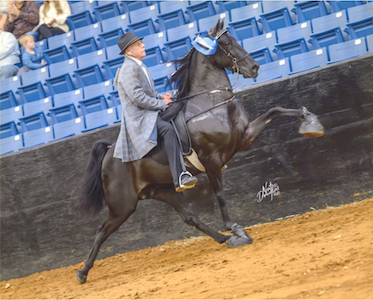
“That same year, I won the Owner-Amateur Novice Show Pleasure World Championship on Apollo Jose’…my first world championship. Three years ago I bought Dark Rain, and sold him to Taylor Walters.”
Despite all of his years in the industry, Joel remembers all of his firsts.
“In Memphis in the olden days, they had a group of saddle clubs,” he said. “There were 18 or 20 of them. They had a show somewhere every Thursday, Friday and Saturday night. They would show all night long. That was the first time I saw a padded horse.”
“I don’t know how I got hooked up with Neal. But working with him, I rode my first padded horse.”
In the early 1980s, he made both his first appearance and first ride in the big oval the same year.
“It was a challenge with 24 or 25 in ring with you. I don’t think I even got a ribbon the first time, but I had fun. I was surprised at the size of the show, especially back then. You were crammed into that stadium. There weren’t any extra seats and it was 20 or 30 miles to find a motel room.”
“My parents had gone to the Celebration starting in the 1950s,” he said. “I was busy in college, and when I went to work for Pfizer they moved me all over the country. I wasn’t available.”
Enjoyable life
The Stewarts have a condo near the Celebration Grounds. They love the life of being walking horse fans. They have a farm near Olive Branch, Mississippi, where he also raises chickens.
“My wife wasn’t a fan at the beginning,” Joel said. “Now she is a fine with it and she would make a pretty decent judge if she wanted to do it.”
Joel enjoys competing, but he also is just as happy watching others showing their horses.
“There are some superb riders like Janice Fostek. She really stands out.”
Joel likes to see a horse progress and prefers the younger horses in the ring.
“I like two and three-year-olds,” he said. “I like the challenge. You ride these horses that are six or eight-years-old and you don’t improve them a lot. But you see a lot of progression in these two and three-year-olds.”
The Stewarts don’t have a box. They can be found in the middle of the West grandstand.
“We have never had a box,” he said. “I can’t see the horses very good in the boxes. We sit 15 rows up on the west side right in the middle. I can see the whole ring. You make friends with the people who are around you. We have had the same people around us for years and years. We look forward to seeing them too. It’s a fun industry.”